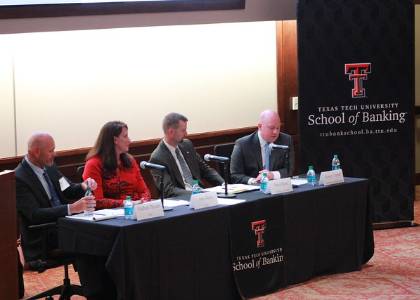
 The 46th annual Texas Tech University School of Banking, held last week, reeled in
record enrollment with 79 participants from Texas, New Mexico, Oklahoma and Arkansas.
The 46th annual Texas Tech University School of Banking, held last week, reeled in
record enrollment with 79 participants from Texas, New Mexico, Oklahoma and Arkansas.
Jeff Mercer, director of the School of Banking and senior associate dean of the Jerry S. Rawls College of Business, was met with applause at a welcoming event when he shared with participants yet another point of progress.
"I'm not sure that it's a record, but it has to be close – 43% of you are women, which is wonderful, and we're working very, very hard to increase that number," he said.
 The school's curriculum exposes participants to many elements of commercial bank management
that help them advance their careers and their banks, Mercer said. Designed for banking
professionals and established by the college in 1973, the school is in session for
a week every August. It blends traditional academic coursework and interactive lecture
sessions hosted by dozens of industry experts and Texas Tech faculty members. After
participants attend in year one, they return in a subsequent summer for another week
of learning to complete the curriculum. This year, 31 bankers successfully completed
the program, said Stephanie Bohn, assistant director of the School of Banking.
The school's curriculum exposes participants to many elements of commercial bank management
that help them advance their careers and their banks, Mercer said. Designed for banking
professionals and established by the college in 1973, the school is in session for
a week every August. It blends traditional academic coursework and interactive lecture
sessions hosted by dozens of industry experts and Texas Tech faculty members. After
participants attend in year one, they return in a subsequent summer for another week
of learning to complete the curriculum. This year, 31 bankers successfully completed
the program, said Stephanie Bohn, assistant director of the School of Banking.
"Part of the mission of the School of Banking is to equip participants with up-to-date knowledge of all major areas of banking, provide them with an expanded network of colleagues, and give them the ability to anticipate and respond to changes in the dynamic banking industry," Mercer said.
Back to School
To kick off the week, entrepreneur and author Tim Tivis addressed the students at a welcome reception and dinner at the North End Zone at the Jones AT&T Stadium. A graduate of Texas Tech's college of business, Tivis is the CEO of Pinnacle Training Group in Lubbock.
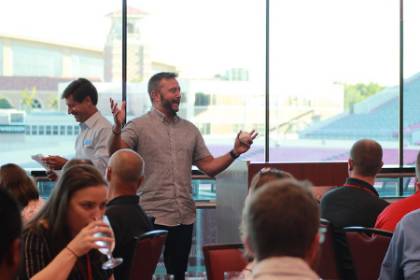 Tivis spoke metaphorically about living life as writing a page or chapter in one's
own book, and he acknowledged how easily time can get away.
Tivis spoke metaphorically about living life as writing a page or chapter in one's
own book, and he acknowledged how easily time can get away.
"At the end of the day, what does that page look like?" he asked. "Pages become chapters, chapters become books, books become volumes, and then you go, 'Whoah! 35 years, 40 years, and your life is laid out before you.
"But here's the beautiful thing, ladies and gentlemen. That ain't – and I know that's not proper English – but that ain't the end. I don't care where you are in your career; if you're looking for a job or if you've been in banking 30 or 40 years, you have the same opportunity tomorrow as anybody else when it's time to start writing your page."
The next evening at a social event at the college, Texas Tech President Lawrence Schovanec addressed participants.
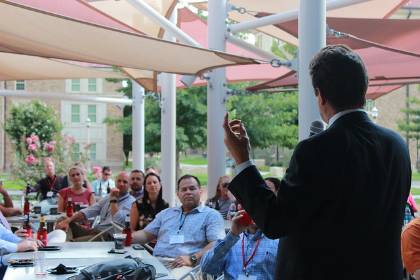 He spoke about the professionalism of banking and noted that he does not recall hearing
jokes about bankers as he sometimes does about other professions.
He spoke about the professionalism of banking and noted that he does not recall hearing
jokes about bankers as he sometimes does about other professions.
"There's a high degree of professionalism associated with the industry, and I think that speaks to you," he said. "And the fact that you're here continuing to cultivate your professional credentials says a lot."
Learning to Be Better Bankers
During the week, year-one classes covered a variety of topics, including: performance and risk analysis, bank auditing, fraud management, operations and lending. Meanwhile, year-two classes covered such topics as asset and liability management, sales culture, leadership, and significant exposure to a nationally-recognized bank management simulator.
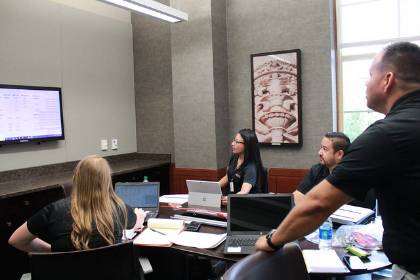 "They've done a good job of covering a broad area of banking that I wouldn't have
been exposed to in my day-to-day job," said first-year student Kelsea Heiman, assistant
vice president of accounting at Happy State Bank in Canyon, Texas.
"They've done a good job of covering a broad area of banking that I wouldn't have
been exposed to in my day-to-day job," said first-year student Kelsea Heiman, assistant
vice president of accounting at Happy State Bank in Canyon, Texas.
She especially appreciated the opportunity to make connections with professionals from across the state of different sizes of banks and see how they're tackling different challenges, she said.
Second-year student Josh Brown works in human resources at First Financial Bank in Abilene, Texas. He enrolled in the School of Banking to gain a better understanding of banking.
"To be successful in human resources in the banking industry, you have to have a detailed understanding of what it is we do and why we do it," he said.
The most memorable part of this year's curriculum was a bank management simulation, he said, because it showed "just how impactful every decision is." In fact, the key takeaway for him "is the impact of all the decisions, even the smallest decisions," Brown said.
Words of Wisdom
The week culminated with a reception and dinner at the Overton Hotel. Among the evening's events was a commemoration of Texas Tech alumnus David Seim, who served as the chair of the School of Banking Advisory Board and whose career in banking spanned almost a half century before he passed away last winter.
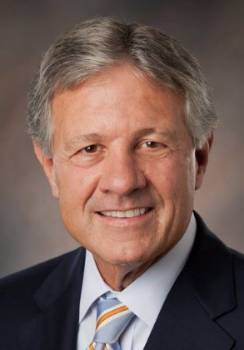 Seim came to Lubbock in 1983 and assumed a leadership role with Lubbock National Bank,
where he rose in the ranks to become its CEO. Early in his career, he also went to
work for Plains National Bank in Lubbock, for which he coordinated the construction
of the bank's building at 50th Street and University Avenue. He later worked for American
National Bank in Amarillo and for Lubbock National Bank before returning to work for
what had become PlainsCapital Bank. After "retiring," he served as Lubbock chairman
for Happy State Bank.
Seim came to Lubbock in 1983 and assumed a leadership role with Lubbock National Bank,
where he rose in the ranks to become its CEO. Early in his career, he also went to
work for Plains National Bank in Lubbock, for which he coordinated the construction
of the bank's building at 50th Street and University Avenue. He later worked for American
National Bank in Amarillo and for Lubbock National Bank before returning to work for
what had become PlainsCapital Bank. After "retiring," he served as Lubbock chairman
for Happy State Bank.
Professor Emeritus of finance Scott Hein, formerly director of the School of Banking for almost 30 years, shared memories of Seim from their decades-long friendship.
"He wasn't a fan of big banks. He was a fan of community banks," Hein said. "And I think that's a legacy that I will always remember and appreciate. ... He always emphasized service above self."
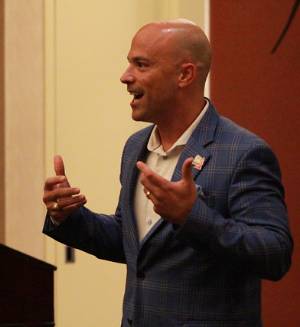 Following Seim's commemoration, the evening's keynote speech was delivered by Shaun
Richardson, who is senior vice president of Informa Financial Intelligence and leads
the benchmarking and applied analytics division of its banking business. He holds
a Master of Science in information systems and quantitative sciences from Texas Tech.
Following Seim's commemoration, the evening's keynote speech was delivered by Shaun
Richardson, who is senior vice president of Informa Financial Intelligence and leads
the benchmarking and applied analytics division of its banking business. He holds
a Master of Science in information systems and quantitative sciences from Texas Tech.
"This is really a pivotal time in our industry," he told attendees.
He spoke about technology's "disruption" of other industries and said the financial services sector is not immune: "Disruption is here. It is real."
He alluded to Amazon, Uber and other companies who were all disruptors at one point when they changed the business landscape by solving points of friction between service providers and customers. He played a video clip from 20 years ago showing a couple of men talking, one of whom said that Amazon, then a new company, was already worth 20% more than Sears in market capitalization. The other man scoffed at the notion. The first man replied, "Investors are focused on the future. Amazon has growth potential as Sears doesn't."
"It's crazy to think that a couple of geeks writing software to sell books could be worth more than Sears," but the once small company of Amazon has indeed prospered over the past two decades, Richardson said.
Richardson joked that he is not saying Amazon is bringing a banking apocalypse, "but I do think we all have to realize that disruption is here. It is in financial services."
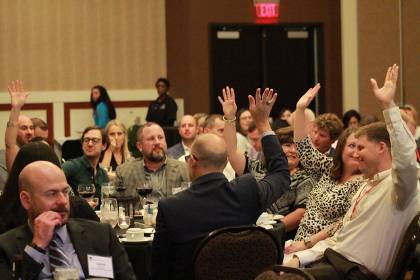 Disruptors in financial services include technology companies, venture capitalists
and megabanks, he said. Holding a smart phone in his hand, he said that it has changed
the way that customers interact with businesses and service providers.
Disruptors in financial services include technology companies, venture capitalists
and megabanks, he said. Holding a smart phone in his hand, he said that it has changed
the way that customers interact with businesses and service providers.
"As you think about financial services and some of the things we put customers through that are old processes on old platforms, there is friction in the process," he said. "... Financial services has a lot of points of friction."
What has made disruptors like Amazon successful is their services are both instantly available and consistently work well, Richardson said, emphasizing that customers want a seamless and positive experience.
On the last day of school, 31 year-two students were presented certificates for successfully completing the School of Banking:
Ally Akberali, Amerant Bank
Anthony Almos, American Bank of Commerce
Chris Blanton, Graham Savings & Loan, SSB
Heather Bledsoe, Bank of the Panhandle
Josh Brown, First Financial Bank
Jimmy Butcher, Allegiance Bank
Kalee Clark, First State Bank
Colton Coker, Peoples Bank
Dustin Epperson, Texas National Bank
Philip Field, Centennial Bank
Christopher Gonzales, Wells Fargo Bank, N.A.
Sidney Gutierrez, Lone Star Capital Bank, N.A.
Colter Headrick, Bank of the Panhandle
Courtney Hodges, Citizens Bank of Clovis
Angela Hogan, First State Bank
Tira Karvas, Texas Tech Federal Credit Union
Alicia Kimberlin, PlainsCapital Bank
David Layton, First State Bank
Mona Lopez, City Bank
Cameron Lust, American Bank of Commerce
Philip McConnell, Happy State Bank
Jo'Elda Perez, Vista Bank
Blake Scott, FirstCapital Bank of Texas
Olga Sifuentes, PlainsCapital Bank
Jordan Stone, First National Bank
Gina Torres, Western Bank
Martha Torres, Amerant Bank
Brenda Varela, Briggs & Veselka Co.
Hondo Webb, Lone Star Capital Bank, N.A.
Michael Webster, PlainsCapital Bank
James Welch, First Federal Community Bank, SSB
View pictures from the week.
To learn more about the School of Banking, visit the school's webpage or contact Stephanie Bohn.
